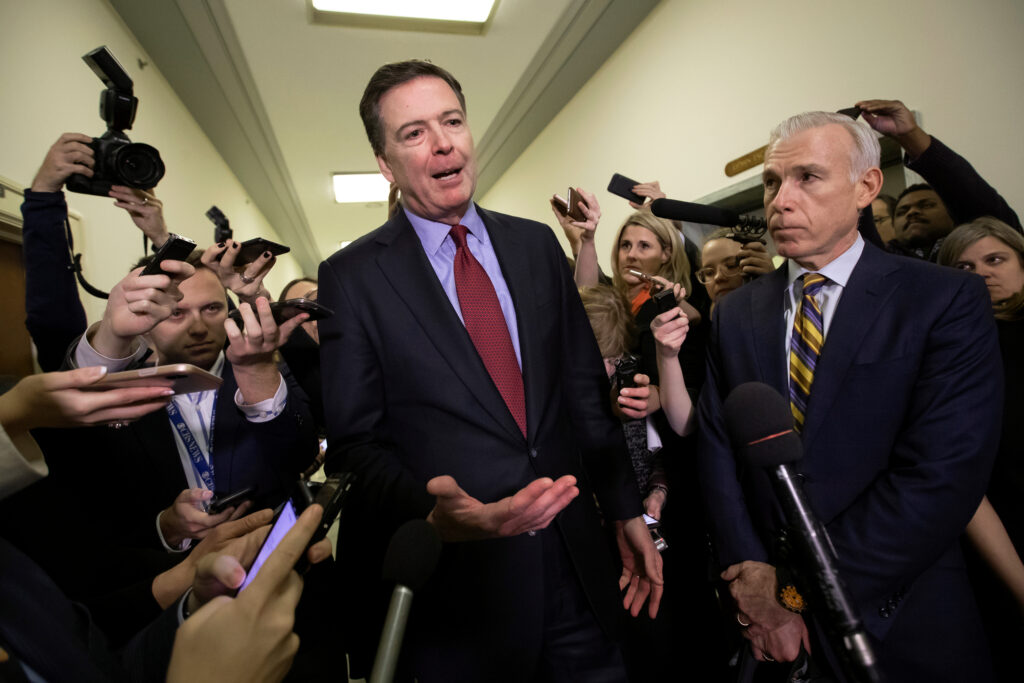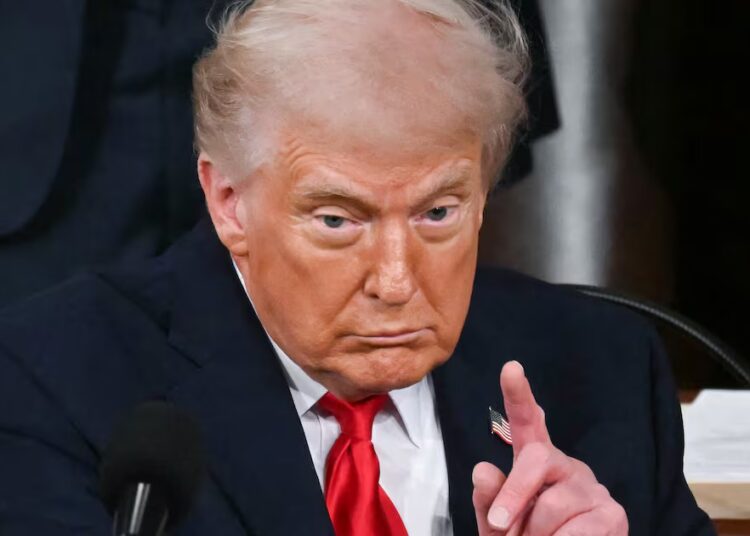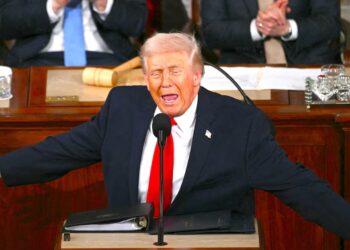The Justice Department’s prosecution of former FBI director James B. Comey has reached a critical juncture, with court rulings expected soon on several defense challenges that could sink the politically charged case.
In recent weeks, judges have expressed doubts over the motivation behind the prosecution, the legitimacy of the U.S. attorney overseeing it and the unusual nature of the grand jury process that resulted in Comey’s indictment.
Their skepticism has highlighted the department’s rushed effort to act on President Donald Trump’s demands for prosecutions of his perceived foes as well as the relative lack of experience of Lindsey Halligan, the prosecutor leading that charge.
An early dismissal would serve as a strong rebuke to Trump’s unprecedented effort to deploy the Justice Department as a tool for his personal retribution.
Here’s what to know about the issues threatening the case:
Vindictive prosecution
Comey, whom Trump fired as FBI director in 2017, is accused of lying in testimony he gave during an appearance before the Senate Judiciary Committee in 2020.
He has denied the allegations and vowed he will be vindicated at trial. But his lawyers have urged a judge to dismiss the case before it reaches that point, saying it was prompted not by any legitimate prosecutorial motive but by long-standing animosity between Comey and Trump.
“The president’s pique or irritation or dislike of James B. Comey is not a justification for bringing down the full weight of the criminal justice system to punish Mr. Comey,” defense lawyer Michael R. Dreeben said at a court hearing last week.
To prevail on that claim, Comey must show that prosecutors, or someone influencing their decision-making, acted with “genuine animus” in deciding to file charges and that there is no other reason that explains why the case has been brought.
The defense team has pointed to Trump’s history, dating back years, of calling for Comey’s prosecution any time the former director has expressed criticism of Trump. That pattern reached its apex, they say, in late September when the president, in a remarkable social media post, directed Attorney General Pam Bondi to swiftly move to prosecute Comey and several other perceived political foes.
“They’re all guilty as hell,” Trump wrote, adding later: “We can’t delay any longer, it’s killing our reputation and credibility.”
The president’s frustration rose after Erik S. Siebert, the prosecutor he had appointed interim U.S. attorney for the Eastern District of Virginia, concluded there was insufficient evidence to move forward with a case against Comey — a decision that, in part, cost Siebert his job.
To replace him, Trump installed Halligan, one of his former personal attorneys with no previous experience as a prosecutor. She took the case before a grand jury and secured an indictment within days of her appointment.
“The eleventh-hour appointment of a political ally for the express purpose of prosecuting a longtime critic, accompanied by a social media post pushing the DOJ to indict, is decisive evidence that the government would not have prosecuted Mr. Comey but for his ‘expression of ideas’ that President Trump disliked,” Comey’s attorneys said in recent filings.
Justice Department lawyers maintain Trump had nothing to do with Halligan’s pursuit of the indictment and dismissed any suggestion to the contrary as nothing more than “innuendo.”
“There has been no proof that anyone but U.S. Attorney Halligan made the decision to present this case to the grand jury and indict,” Assistant U.S. Attorney N. Tyler Lemons said in court last week. “Ms. Halligan was not directed to seek this prosecution. It was her decision and her decision only.”
During the hearing, U.S. District Judge Michael Nachmanoff offered no clear indication of when or how he might rule. But he repeatedly questioned whose intentions matter in determining whether the case is driven by improperly vindictive motives — the president’s or Halligan’s.
The validity of Halligan’s appointment
Comey’s lawyers have also challenged the validity of Halligan’s appointment, saying it violated a federal law governing who temporarily fills U.S. attorney positions when there is no Senate-confirmed pick.
Federal statutes empower the attorney general to name an interim U.S. attorney for a period of 120 days. If the Senate has not confirmed a nominee by the end of that time, the law says the judges in the relevant federal judicial district can name their own temporary replacement.
Before he was forced out of his post by Trump, Seibert had already served a full 120-day term as interim U.S. attorney and been reappointed to his position by the courts.
Comey’s lawyers contend that the law does not permit the attorney general to make successive 120-day appointments and that it was the court’s prerogative — not the Trump administration’s — to appoint Siebert’s successor.
That question is especially important in Comey’s case because Halligan played a much larger role in securing the indictment than U.S. attorneys typically do. She was the only prosecutor involved in presenting the case to the grand jury — a process typically handled by career prosecutors working under the presidential appointee.
Comey’s lawyers say that if Halligan’s appointment is declared invalid, any actions she took as U.S. attorney — including securing the indictment — must be declared void and the case should be thrown out.
“The only thing that matters was did Ms. Halligan have the proper authority when she stood up before the grand jury,” defense lawyer Ephraim McDowell said recently in court. “She did not.”
The Justice Department disputes that. It maintains the attorney general can appoint as many interim U.S. attorneys for 120-day periods as is necessary until the role is permanently filled.
But U.S. District Judge Cameron McGowan Currie expressed deep skepticism of the government’s argument during a Nov. 13 hearing on the issue.
She noted that under prosecutors’ interpretation of the law, the administration could avoid the Senate confirmation process altogether by appointing one interim U.S. attorney after another for a full four-year term. That, Currie suggested, would run counter to the spirit of the statute.
Currie has said she intends to issue her ruling on the matter before Thanksgiving. But if she declares Halligan’s appointment invalid, the impact on the case is not certain.
Currie could allow the prosecution to move forward under the supervision of the other career Justice Department lawyers who have since signed on to the case and whose authority is not in question. That’s been the solution preferred by other federal judges who have considered recent challenges to Trump’s temporary U.S. attorney picks in New Jersey, California and Nevada.
But she could decide that because Halligan was the only prosecutor involved in securing the indictment, the case must be dismissed.
Should Currie take that position, she could permit the Justice Department to seek a new indictment — this time through a lawfully appointed prosecutor. She could also bar the department from ever attempting to revive the case.
Comey’s lawyers have urged Currie to pick the latter route. They note the statute of limitations on the crimes with which Comey is charged was days from expiring when he was indicted. If the indictment is thrown out now, they say, it’s too late for the Justice Department to try again.
Grand jury ‘missteps’
Halligan’s actions during her grand jury appearance have drawn the most scrutiny from judges in the past several days.
In a blistering Nov. 17 opinion, U.S. Magistrate Judge William Fitzpatrick detailed what he described as a “disturbing pattern of profound investigative missteps” and “possible government misconduct” that may have fatally undermined the integrity of the proceedings.
He accused Halligan of making “fundamental misstatements of the law” to the grand jury and potentially violating Comey’s rights by allowing an FBI agent to appear before the panel even though he may have been exposed to evidence that should have been protected by attorney-client privilege. The agent was the government’s sole witness before the grand jury.
Nachmanoff extracted from prosecutors a potentially even more damaging concession at a court hearing Wednesday: Lemons told the judge that the full grand jury may never have seen the final version of the indictment filed in the case.
As Lemons described it in court, Halligan initially sought to indict Comey on three counts. But the grand jury rejected one of the charges while approving the other two. Prosecutors revised the charging document to remove the rejected count.
Rather than presenting that amended document to the full grand jury for approval, Lemons said, Halligan simply had the foreperson sign the new indictment before filing it with a judge.
Prosecutors say the two indictments were identical in all other respects. But Nachmanoff on Wednesday questioned whether that procedural oversight should affect the viability of the case.
Comey’s lawyers maintain the misstep means “there is no valid indictment of Mr. Comey.”
The Justice Department has fiercely defended Halligan’s performance. In a court filing Thursday, Lemons insisted that — contrary to what he had told Nachmanoff just a day earlier — the full grand jury actually had reviewed the final indictment.
His co-counsel Gabriel Diaz, meanwhile, accused Fitzpatrick of mischaracterizing Halligan’s statements to the grand jury, which the magistrate judge had described as misrepresentations of law.
“The complete transcript [of the grand jury proceedings] demonstrates the opposite,” Diaz wrote.
Fitzpatrick had pointed to two specific instances in which Halligan, facing tough questions from the panel, had sought to explain away gaps in the government’s evidence.
In the first, he said, she appeared to suggest that Comey would have to answer the questions himself and explain his innocence at trial — a mischaracterization of the government’s burden to prove its case beyond a reasonable doubt.
At another point, Halligan appeared to improperly suggest the grand jury members did not have to rely only on the evidence before them but could indict on the assumption that the government would have “better evidence” that would be presented at trial, the judge said.
Diaz, in court papers Thursday, maintained that a more complete review of Halligan’s remarks showed she’d been taken out of context. But he redacted the extended excerpt from Halligan’s statements he included in his filing.
Comey’s lawyers moved Friday to seek the case’s dismissal based on those irregularities and other instances of what they described as Halligan’s “flagrant violation of basic grand jury rules.”
“That strong remedy will also send a signal to the President and the Department of Justice that the current practice of politically motivated prosecutions violates bedrock American constitutional principles,” they wrote.
The post The three big issues that could sink the Comey prosecution appeared first on Washington Post.



